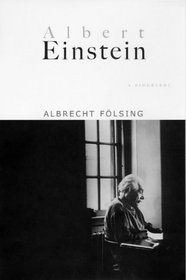I thought that it was a pretty thorough bio of Einstein, but I wish there had been a tad bit more science. I think the ideal reader would be well-acquainted enough with relativity and quantum physics to follow what the biographer's talking about in many places, but not a physicist. I guess it'd be a dilettante of physics who's a bit more versed than me.
In fact, you know what would really help this book? An appendix that gives a good layman's explanation of special relativity and general relativity.
Folsing's a bit dismissive of Einstein's refusal to accept quantum theory as the actual nature of things. Einstein well-understood, and Folsing even acknowledges that Einstein understood, that the quantum model is a good model and makes accurate predictions, he just didn't think it got at the true nature of the way things are. And one can almost hear Folsing chuckling condescendingly as he wrote about Einstein being quixotic in his attempt to topple the quantum model establishment. Maybe Einstein was wrong (apparently the EPR paradox resolution by Bell's theorem indicates that, but it boggles me), but the questioning of whether two identical but opposite-momentum particles could have both their position and velocity measured was a good one. It was exactly the kind of niggling gap that led Einstein to the theory of relativity in the first place, and the kind of niggling gap Einstein explicitly stated he used to drive his contemplations through his life.
I guess that's a peeve, though. Will you like the book? Is it worth reading? I liked the writing, and Einstein's life is compelling. So, yeah.
In fact, you know what would really help this book? An appendix that gives a good layman's explanation of special relativity and general relativity.
Folsing's a bit dismissive of Einstein's refusal to accept quantum theory as the actual nature of things. Einstein well-understood, and Folsing even acknowledges that Einstein understood, that the quantum model is a good model and makes accurate predictions, he just didn't think it got at the true nature of the way things are. And one can almost hear Folsing chuckling condescendingly as he wrote about Einstein being quixotic in his attempt to topple the quantum model establishment. Maybe Einstein was wrong (apparently the EPR paradox resolution by Bell's theorem indicates that, but it boggles me), but the questioning of whether two identical but opposite-momentum particles could have both their position and velocity measured was a good one. It was exactly the kind of niggling gap that led Einstein to the theory of relativity in the first place, and the kind of niggling gap Einstein explicitly stated he used to drive his contemplations through his life.
I guess that's a peeve, though. Will you like the book? Is it worth reading? I liked the writing, and Einstein's life is compelling. So, yeah.




